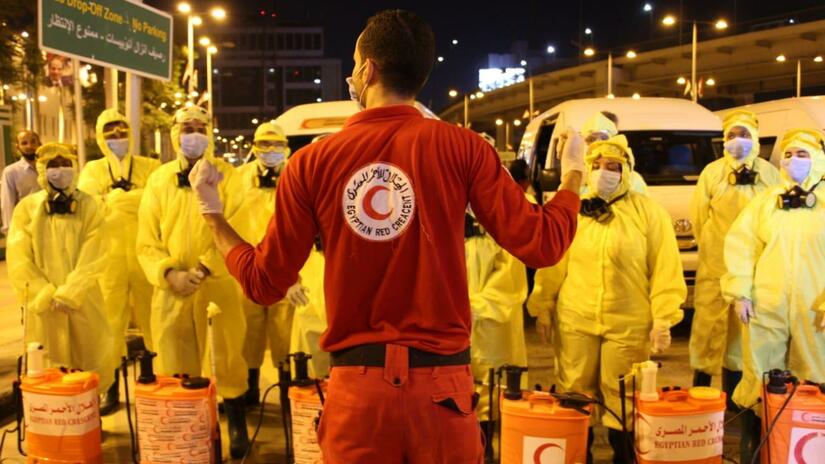Randa El Ozeir: Everywhere on the planet, we hear news about COVID-19. Despite this fact, some remote places stayed sheltered from the scene without receiving or watching reports about it, thus they were kept in the dark regarding the details of the virus or the scope of its dangers. These locations are secluded in Al-Oued State to the south east of Algeria where the Algerian Red Crescent (ARC) is working on providing knowledge, awareness, prevention steps, imperative quarantine when needed due to COVID-19, and even food aids within reach.
The journey of the ARC team lasts 10 hours to two full days depending on the distance required to get to the nomadic Bedouin families. The convoy usually leaves the ARC’s state committee office in Al-Oued city and necessitates taking four-wheel-drive cars to cross the tricky sandy roads of the Algerian Sahara. But at the finish line, the nomadic Bedouin families receive the volunteers’ convoy with open arms and twinkling eyes. Salem Bou Slah, a field paramedic and the head of the ARC’s social media platforms, said, “The volunteers face no issues in introducing the families to the ARC and its humanitarian activities, as our relationship goes back a long way. The ARC’s flapping flag on top of the cars represents for them hope and assistance. Also, the volunteers connect personally with some of these families”.
The situation in these isolated parts of Al-Oued State is different and the internet connection there isn’t reliable. Prior to the arrival of the ARC teams, the nomadic Bedouins didn’t know about the virus, its risks, and the ways of its transmission, unlike the population of the urban areas of the State who benefitted from the prevailing of social media and satellite channels. Due to the ethnic diversity in these far spots, the ARC volunteers, who number around 400 people specialized as nurses and doctors from various social and educational levels, play a very important intermediary role in simplifying the concepts and notions in the Bedouin’s language, conveying the awareness messages, and explaining the relevant health practices to illiterate-ravaged groups. And the volunteers try, with what is available, to bridge the gaps stemming from the absence of health facilities, hospitals, and even clean drinking water.
Nomadic Bedouin families don’t settle down in permanent locations and keep moving on the border strip between Algeria and Tunisia. The ARC nurse, Masoud Al-Taieb who has joined the ARC as a volunteer since 2012, told us about the singularities of these families that constantly change places where they must mingle with people from various localities, “therefore, these families become more susceptible to waterborne and infectious diseases, and many of their children don’t receive their vaccinations regularly and on time. The ARC contributes by supplying them with the vaccines and the medical services”.
Such visits to the Bedouin families aren’t unprecedented, although they have increased in numbers and frequency lately with the spread of COVID-19. “The visits to the families happen periodically under the ARC volunteers’ flag in Al-Oued State. The State committee consists of different cells, such as “Community’s Health”, “Media and Communications”, “Field Paramedics”, and “Feminist and Childhood’s Protection”, said Mr. Boudiaf Said, the president of ARC’s State committee in Al-Oued. To date, 734 families with about 800 children and over 113 seniors have reaped the benefits of 2000 food packages and health follow-up examinations in coordination with the “Civic Protection” and “Military Health” that have means. In practice, “volunteers deliver their services. I provide a health service in the hospital where I work to help the destitute families that cannot afford the treatment or the trip to faraway hospitals”, said Al-Taieb. The ARC does sensitization and sterilization operations as well.
The ARC’s part here is exceptionally important and sensitive. Virtually everyone is aware of the reserved nature within the structure of the nomadic Bedouin families that demands presence of female, not male, volunteers to communicate directly with the women in these families. Hence, the primordial importance of the female activists within the ARC. They are the ones who make sure the awareness messages have been delivered and the service has been scaled up to pass to as many women as possible in the local community. Al-Taieb weighed in on this saying, “Most of these families choose herbal remedies as a main treatment, but this can pose a risk in some cases, especially on women, pregnant women, and children. Our work of providing health and nutrition assistance is of great value”.
In the light of these hard times, the food assistance that the ARC insists on distributing also became a resource for these families to stave off hunger. Like many places around the world, this region in Al-Oued State got hit hard economically due to COVID-19. It is a major farming source in the country that banks on exporting agricultural products (34% of all the exported vegetables are from it) affected by the quarantine and the suspension of air flights. Notwithstanding the organized exportation campaigns to help the farmers, the nomadic Bedouins carried the hefty burden of the negative effects occurring from the curfews and the shutdown of livestock markets.
General Background:
the Algerian Red Crescent (ARC) was founded in 1956 during the peak of the liberation and independence revolution. The ARC is considered the most ancient humanitarian organization in Algeria. Its first work was treating the war’s casualties. After getting recognized by the government as an independent voluntary relief society, the ARC joined the International Federation of Red Cross Red Crescent (IFRC) in July 1963. It has 48 branches around the States and an office in each city, which has many committees that provide basic health services, humanitarian aids, charitable assistance, along with another set of environmental, sports, and arts activities.
Article
Investing in women means ‘access to resources to overcome challenges’
Investing in women means ‘access to resources to overcome challenges’
| Article

